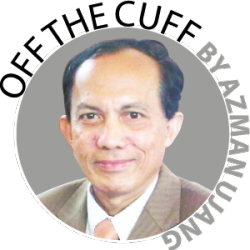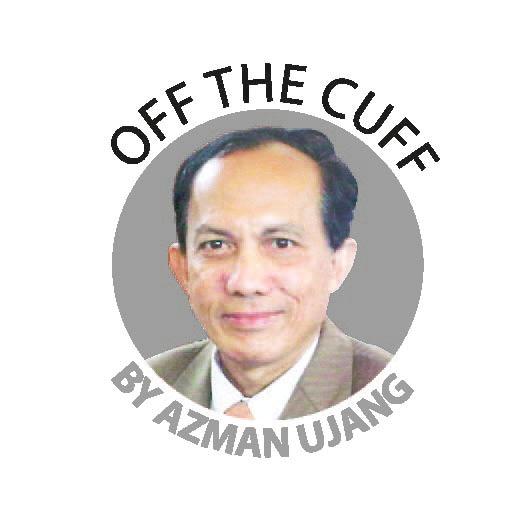OF all the jobs classified as the three D – dirty, dangerous and difficult – none fits the description as well as what is done by Indah Water Konsortium (IWK), our national sewerage company.
What could be dirtier than cleaning the sludge that goes into the sewage pipes every time we flush?
It’s dangerous and difficult as well when you consider that IWK manages some 7,000 treatment plants in the country with only 3,311 employees or less than half the number of its plants.
It might be more shocking for the public to know that no other country manages that many treatment plants with such a small number of employees, making IWK easily the most lean and efficient public service operator in the country.
It has won awards and is recognised internationally as the best managed sewerage company in Asia and one of the best in the world.
If you think I’m flattering IWK, consider this – with 3.9 million customers, its employee to customer ratio is 1:1,179.
In comparison, Malaysia’s largest utility company, Tenaga Nasional Berhad (TNB) with a customer base of 8.4 million or slightly double IWK’s, has a staggering 38,000 employees or a ratio of 1:210.
And this one might not sound like an apple to apple comparison, but Hospital Kuala Lumpur, one of the world’s largest general hospitals, has almost 10,000 staff or three times that of IWK.
To top it off, IWK’s pipeline system that carries the sludge to treatment plants tasked with managing a service critical for the protection of public health, water resources and the environment, is equivalent to the distance between Kuala Lumpur and Brazil! Or 20,000km to be precise.
Telekom Malaysia has about 25,000 employees while state water companies have nearly 20,000.
But here comes the greatest irony of it all – the tariff that customers pay for this vital public health service has not been increased since it was privatised 25 years ago.
Six years after its privatisation, IWK was brought under the fold of the Minister of Finance Incorporated as its previous business model proved unsustainable due to mounting arrears owed by customers.
The amount of unpaid bills at the end of 2017 reached almost RM900 milllion but efforts by IWK to reach out to stubborn customers seemed to have paid off as it managed to cut its arrears to RM600 million.
This is still too much and indicates that many Malaysians do not pay their dues on time.
Look at the billions owed to PTPTN, which gives out study loans. At the end of 2018, RM6.8 billion was overdue and 68% of the borrowers were in default for over a year.
Another irony is that while IWK provides a world-class service, its tariff is cheap even by Third World standards.
Imagine each household is charged only RM8 a month and the rate is only RM2 for low-cost housing.
An average Malaysian family of five only pays 27 sen daily and for the 800,000 low-cost houses with five toilet users, it’s virtually free or 6 sen daily. Even printing the bills costs more.
Something is wrong in the way such a cheap tariff is fixed in the first place and there is perhaps a relation to customers’ reluctance to pay their bills on time.
In other words, they tend to accumulate the bills for months instead of going to payment centres just to settle an RM8 bill or even worse, the RM2 one which is more than the parking fee near such offices.
I’m making a strong case here these unreasonable low tariffs to be fixed at market rate or the actual cost of providing such service which can come up to RM22 a household just to cover the operating expenditure.
In terms of capital expenditure, the government is financing costs up to RM80 a household.
Since being taken over by the Finance Ministry, billions have been spent to subsidise the service or between RM150 million and RM200 million yearly.
Over the last three Malaysia plans, the government has invested about RM10 billion to upgrade sewerage infrastructure.
According to Water, Land and Natural Resources Minister Dr Xavier Jayakumar, there are plans to increase the tariffs by linking sewerage charges to the consumption of water.
What it means is that the more water is used by households, the higher the sewerage charges once it’s implemented.
Another move the minister is toying with is joint billing for water and sewerage, and this is something that is also long overdue.
It has become obvious to industry players that customers are reluctant to pay their bills because unlike water supply, IWK cannot disconnect customers’ sewerage system even if they default on bills.
For that matter, one of the first bills the average household pays promptly is the water bill. So if the sewerage bill is tagged on to the water bill, IWK can slowly get its hard earned money back.
Two things are needed – political will and public education on the vital service.
Jayakumar said joint billing has been successful in Labuan and he’s waiting for the green light from several states before implementing it nationwide.
I’m somewhat sentimental about this joint billing system because during a briefing for the media by the pioneer management team of IWK some 25 years, I suggested this system.
I said that without joint billing, IWK would face non-payment of bills for the reasons mentioned above.
On hindsight, IWK could have remained sustainable without massive government subsidy had the idea been adopted then but it fell on deaf ears.
It’s never late to revisit this and it’s comforting to note that such a move is on the cards.
The media must also play its part in pricking public conscience so that customers have no qualms paying more for this vital service. It’s the least they could do as responsible citizens.
The next time we use the toilet, think about this three D service and the company that provides it.
Comments: letters@thesundaily.com














